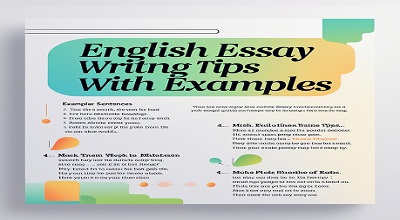English Essay Writing Tips
English Essay Writing Tips: Essay writing is a fundamental skill in academic and professional settings. Whether you’re a student or a professional, the ability to articulate thoughts clearly and persuasively is essential. This guide provides the latest tips, techniques, and examples to help you master essay writing.
Why Essay Writing Matters
- Enhances critical thinking
- Improves communication skills
- Essential for academic success
- Useful in professional reports and presentations
Understanding Different Types of Essays
Different essays serve different purposes. Here are the most common types:
a. Narrative Essays
- Tell a story or describe an experience.
- Example: “The Day I Overcame My Fear of Public Speaking”
b. Descriptive Essays
- Paint a vivid picture using sensory details.
- Example: “A Walk Through the Autumn Forest”
c. Expository Essays
- Explain a topic factually.
- Example: “The Impact of Social Media on Teenagers”
d. Persuasive Essays
- Convince the reader of a viewpoint.
- Example: “Why Schools Should Implement Longer Recess Periods”
e. Argumentative Essays
- Present arguments with evidence.
- Example: “The Benefits of Universal Healthcare”
Pre-Writing Strategies
Before writing, follow these steps:
a. Brainstorming Ideas
- Use mind maps or freewriting.
- Example: List pros and cons of online learning.
b. Researching the Topic
- Use credible sources (books, journals, websites).
- Example: Cite studies on climate change for an environmental essay.
c. Creating an Outline
- Organize main points logically.
- Example:
- Introduction (Hook, Thesis)
- Body Paragraph 1 (Main Point + Evidence)
- Body Paragraph 2 (Counterargument + Rebuttal)
- Conclusion (Summary, Final Thought)
Structuring Your Essay
A well-structured essay follows this format:
a. Introduction
- Hook: “Did you know that 80% of people fear public speaking?”
- Background info
- Thesis statement: “Effective preparation and practice can help overcome this fear.”
b. Body Paragraphs
- Topic Sentence: “One key strategy is practicing in front of a mirror.”
- Evidence: “A Harvard study found that rehearsal reduces anxiety by 40%.”
- Analysis: “This shows that familiarity builds confidence.”
Conclusion
- Restate thesis
- Summarize key points
- End with a thought-provoking statement
Writing a Strong Introduction
Tips:
- Start with a shocking fact, quote, or question.
- Keep it concise (3-5 sentences).
- Clearly state the thesis.
Example:
“Imagine a world without bees—our food supply would collapse. Bees play a crucial role in pollination, yet their population is declining. This essay explores the causes of bee extinction and solutions to prevent it.”
Developing Body Paragraphs
PEEL Method:
- Point: State the main idea.
- Evidence: Provide data or examples.
- Explanation: Connect evidence to the argument.
- Link: Transition to the next paragraph.
Example:
“Deforestation is a major cause of habitat loss (Point). According to WWF, 27% of the Amazon has been destroyed (Evidence). This forces bees to migrate, reducing pollination rates (Explanation). Therefore, protecting forests is essential (Link).”
Crafting a Powerful Conclusion
Tips:
- Avoid introducing new ideas.
- Reinforce the thesis.
- End with a call to action or question.
Example:
“In conclusion, saving bees requires global effort. By banning harmful pesticides and planting more flowers, we can secure our future. Will you take action today?”
Editing and Proofreading Techniques
- Read aloud to catch errors.
- Use grammar tools (Grammarly, Hemingway Editor).
- Check for clarity and coherence.
Common Mistakes to Avoid
- Weak thesis: “This essay is about pollution.” (Too vague)
- No evidence: Making claims without proof.
- Poor transitions: Jumping between ideas abruptly.
Examples of Well-Written Essays
Persuasive Essay Example:
Title: “Why Recycling Should Be Mandatory”
Thesis: “Mandatory recycling laws reduce waste, conserve resources, and protect the environment.”
Body Paragraph: “Recycling cuts landfill waste by 30% (EPA, 2023). Cities with recycling laws report cleaner streets and lower pollution levels.”
FAQs on Essay Writing
1. How do I choose a good essay topic?
Pick a topic that interests you, has enough research material, and fits the essay type.
2. How long should an essay be?
Depends on requirements—usually 500-1500 words for academic essays.
3. Can I use “I” in an essay?
In narrative or reflective essays, yes. In formal essays, avoid it unless specified.
4. How do I make my essay stand out?
Use unique examples, strong arguments, and a compelling writing style.
5. What’s the best way to improve essay writing?
Practice regularly, read quality essays, and seek feedback.
Conclusion
Mastering essay writing takes practice, but with these tips and examples, you can improve significantly. Focus on structure, clarity, and evidence to craft compelling essays. Happy writing!
Would you like additional examples or a specific type of essay expanded? Let me know!
Free Links: Zombie Highway 2 MOD APK
